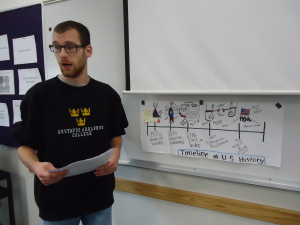 For our lower level elementary lesson our group decided to do some work with chronology. We taught the importance of chronological order and how it is an effective way to record and present historical events. For starters we had students warm up to the idea of a timeline by having them record events that happened in their week, their month, and the year. We then asked students to create timelines of their lives, the life of a person of interest (grandma, guardian, favorite athlete, etc.), and provided examples for the students to evaluate. We also demonstrated an effective timeline by presenting them with a timeline of U.S. history over the course of 300 years. They were able to find the similarities and differences of their timelines and those we had provided . We taught students the components of a historical timeline and the uses/importance that these records hold in historical discovery.
For our lower level elementary lesson our group decided to do some work with chronology. We taught the importance of chronological order and how it is an effective way to record and present historical events. For starters we had students warm up to the idea of a timeline by having them record events that happened in their week, their month, and the year. We then asked students to create timelines of their lives, the life of a person of interest (grandma, guardian, favorite athlete, etc.), and provided examples for the students to evaluate. We also demonstrated an effective timeline by presenting them with a timeline of U.S. history over the course of 300 years. They were able to find the similarities and differences of their timelines and those we had provided . We taught students the components of a historical timeline and the uses/importance that these records hold in historical discovery.
Sophie, Zach, Laura, Alex and Long
Zach’s Thoughts:
I thought this was a great activity! It was a great activity. Most of us (sorry Sophie and Alex) got to feel what it was like to teach on our own, we had to work out appropriate pacing, we could be flexible and add a personal touch to each of our lessons, we had some freedom in picking out our standards and designing a suitable lesson, and so on. This activity was immensely beneficial, and I think we all learned a great deal about our teaching strategies and the teaching strategies of our peers. When looking at our lessons specifically I really enjoyed both of these activities. One activity allowed students some hands-on materials and asked them to put themselves in another persons shoes (which I think is one of the best things one can do when teaching history, it personalizes the content), and the other lesson allowed students to tie their personal lives into class and share with their peers (kids at the lower levels of elementary school love sharing things about themselves or their family). These were great lessons in that we played off student’s interests developmentally. We allowed for comparisons, interpretation, worked on historical thinking & questioning skills, taught empathy, connected the content to their lives, etc. These lessons were successful and I had a great time teaching them.